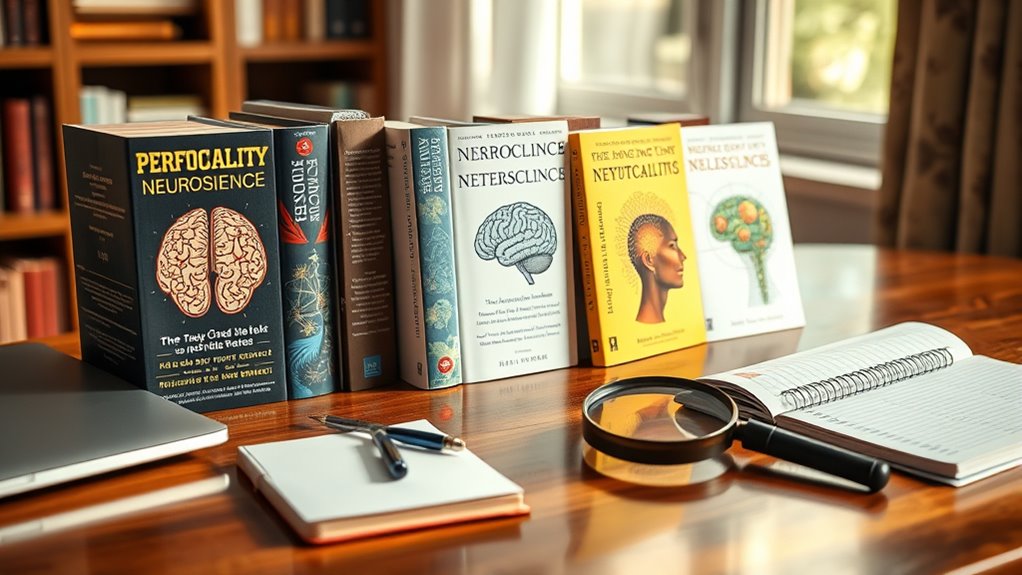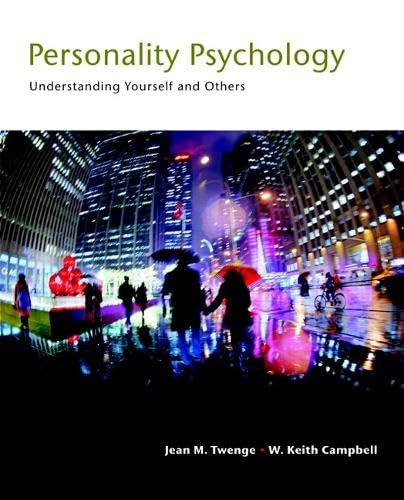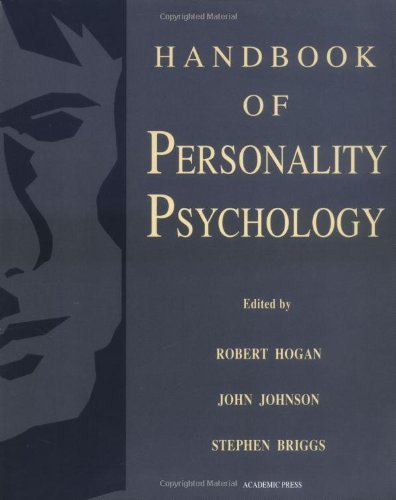If you’re curious about how neuroscience explains personality and behavior, I recommend exploring several top books that combine scientific research with practical insights. These titles cover everything from brain imaging studies to personality theories like MBTI and Jungian functions, offering a well-rounded understanding of the mind. They’re perfect for students, professionals, or anyone interested in human diversity. Keep exploring, and you’ll uncover compelling connections between brain activity and who we are.
Key Takeaways
- Prioritize books grounded in scientific research, neuroimaging, and empirical studies linking brain activity to personality traits.
- Look for titles that integrate neuroscience with psychological theories like MBTI, Jungian functions, or personality assessments.
- Choose books offering practical insights into how brain structures influence behavior, mental health, and personal development.
- Consider works with clear explanations, accessible language, and real-world applications for education, therapy, or self-awareness.
- Evaluate sources for credibility, author expertise, and the inclusion of current neuroscience findings to deepen understanding of brain-behavior relationships.
Neuroscience of Personality: Brain Savvy Insights for All Types of People
If you’re curious about how your personality relates to brain activity, this book is an excellent choice for anyone interested in scientific insights into personality types. I found Dario Nardi’s “Neuroscience of Personality” fascinating because it links EEG data to Myers-Briggs and Jungian functions, making complex concepts accessible. The research is grounded in experiments, providing credible evidence that specific brain regions associate with different personality traits. I appreciate how it combines psychology and neuroscience, helping me understand myself and others better. Whether you’re into self-discovery or scientific exploration, this book offers practical, brain-based insights to deepen your understanding of personality.
Best For: individuals interested in understanding the scientific links between personality types and brain activity, including psychology enthusiasts, students, educators, and professionals seeking self-awareness or personal development.
Pros:
- Provides scientifically grounded insights by linking EEG data with personality theories like MBTI and Jungian functions.
- Accessible and engaging writing style that makes complex neuroscience concepts understandable for a broad audience.
- Offers practical applications for improving education, career choices, and interpersonal relationships.
Cons:
- Some readers may find the neuroscientific implications somewhat preliminary or overstated.
- Depth of scientific detail might be limited for those seeking highly technical or exhaustive research.
- A few critiques question the direct causality between brain activity and personality traits, suggesting further research is needed.
The End of Mental Illness Book on Neuroscience and Psychiatry
Anyone interested in a groundbreaking, neuroscience-based approach to mental health will find “The End of Mental Illness” by Dr. Daniel Amen compelling. He champions a paradigm shift, emphasizing brain health through brain scans and imaging to diagnose and treat mental disorders like mood issues, anxiety, ADHD, and addiction. Instead of relying solely on medications, he advocates lifestyle changes—diet, exercise, sleep—to prevent and reverse illness. His critique of conventional psychiatry highlights the importance of understanding the brain’s biological roots, promoting compassion and reducing stigma. Supported by extensive research, this book offers practical insights for patients and professionals seeking more effective, personalized mental health solutions.
Best For: individuals seeking a science-based, holistic approach to understanding and improving mental health through brain science and lifestyle changes.
Pros:
- Provides a groundbreaking, neuroscience-centered perspective that challenges traditional psychiatry.
- Emphasizes practical, lifestyle modifications for prevention and recovery, reducing reliance on medications.
- Supported by extensive brain imaging research, offering credible and personalized treatment insights.
Cons:
- Some readers may view it as a promotional tool for Dr. Amen’s clinics and products.
- The focus on brain imaging may not be easily accessible or affordable for everyone.
- Critics might argue that it underplays the complex chemical and environmental factors involved in mental illness.
The American Psychiatric Association Publishing Textbook of Neuropsychiatry and Clinical Neurosciences
The American Psychiatric Association Publishing Textbook of Neuropsychiatry and Clinical Neurosciences is ideal for neuropsychiatrists and trainees seeking a practical, focused resource. It emphasizes neuropsychiatry over broad neuroscience, making it manageable and directly applicable to clinical practice and exams. While it’s less exhaustive than some texts, its clarity and targeted content help deepen understanding without overwhelm. The book complements other resources like Arcinegas’ and Moore’s works, offering a well-rounded collection. If you want up-to-date, relevant information tailored for neuropsychiatry professionals, this textbook is a valuable, accessible tool to enhance your knowledge and skills.
Best For: neuropsychiatrists and trainees seeking a practical, focused resource to enhance clinical practice and exam preparation in neuropsychiatry.
Pros:
- Emphasizes neuropsychiatry over broad neuroscience, making it more manageable.
- Clear, targeted content suitable for training and clinical use.
- Complements other specialized texts, providing a well-rounded resource.
Cons:
- Less comprehensive than broader neuroscience references.
- May lack in-depth coverage of some advanced topics.
- Designed primarily for practicality, possibly at the expense of extensive theoretical detail.
Cognitive-Behavioral Treatment of Borderline Personality Disorder
Cognitive-Behavioral Treatment of Borderline Personality Disorder offers a thorough guide for clinicians and advanced students seeking to understand and apply evidence-based approaches. Drawing from my personal experience and extensive literature, I’ve seen how Dialectical Behavior Therapy (DBT), a specialized form of CBT, effectively addresses BPD’s emotional dysregulation and impulsivity. Linehan’s research emphasizes mindfulness, dialectical thinking, and skills training, making therapy highly structured yet adaptable. Despite its complexity, DBT has proven to be life-changing, especially in preventing self-harm and suicidality. This book is a crucial resource, blending scientific rigor with compassionate insight, essential for mastering BPD treatment.
Best For: clinicians, advanced students, and mental health professionals seeking an in-depth, research-based manual for understanding and applying Cognitive-Behavioral Therapy, especially Dialectical Behavior Therapy, for treating Borderline Personality Disorder.
Pros:
- Provides comprehensive, detailed insights into DBT, including core concepts like mindfulness and skills training.
- Combines scientific rigor with compassionate, real-world application, making complex ideas accessible.
- Serves as a foundational manual that enhances understanding of therapist-client dynamics and practical therapy implementation.
Cons:
- Dense and highly detailed, which may be overwhelming for beginners or those new to BPD treatment.
- Requires significant training and commitment to apply effectively, limiting immediate usability for some practitioners.
- The high cost and extensive content may be a barrier for casual readers or those seeking quick reference guides.
Personality Theories Workbook
If you’re studying personality psychology and want a practical tool to deepen your understanding, the Personality Theories Workbook is an excellent choice. It offers organized case studies by theorist, with follow-up questions that apply ideas and compare theories. Short, engaging scenarios help you grasp complex concepts and promote active learning. The sixth edition features clear writing, interesting examples, and real-world applications, making it perfect for students and instructors alike. Despite minor shipping damage, the workbook arrived in great condition and is affordable compared to campus options. Many users praise its usefulness for review and teaching, making it a valuable resource for exploring personality theories in depth.
Best For: students and instructors seeking a practical, engaging resource to deepen their understanding of personality theories through case studies and active learning.
Pros:
- Organized case studies by theorist with follow-up questions for application and comparison
- Clear, engaging writing with real-world examples and practical applications
- Affordable alternative to campus bookstore options with high user ratings
Cons:
- Minor shipping damage (bent cover) upon delivery, though overall condition remains good
- Limited to the sixth edition; may require updates for the latest theories or research
- Primarily designed for educational use; less suitable as a standalone reference for advanced practitioners
Personality Psychology: Domains of Knowledge About Human Nature
Anyone studying psychology who needs a thorough understanding of human nature will find “Personality Psychology: Domains of Knowledge About Human Nature” an invaluable resource. I bought this book just two days before classes started, and it arrived on time in perfect condition. It’s well written, with an appealing layout, offering extensive, research-based content—though sometimes overly detailed. While it made an interesting subject somewhat dry and its exercise questions felt unhelpful, it’s exactly what I needed for my coursework. Despite the reading style impacting engagement, I see its value as a foundational textbook, essential for anyone delving into personality psychology.
Best For: psychology students and educators seeking a comprehensive, research-based textbook on human personality fundamentals.
Pros:
- Well written with an appealing layout that enhances readability
- Thorough coverage of essential research and concepts in personality psychology
- Perfect condition and timely delivery, making it reliable for coursework
Cons:
- Sometimes overly detailed, which can be overwhelming
- Writing style may make the material somewhat dry and less engaging
- Exercise questions are considered unhelpful for reinforcing learning
Personality Adaptations: Human Understanding in Psychotherapy
For psychotherapists and mental health professionals seeking a practical, non-judgmental way to understand personality adaptations, this book offers invaluable insights rooted in Transactional Analysis. It emphasizes viewing personality not as a pathology but as adaptive responses that everyone develops. The approach helps you diagnose and intervene with tailored strategies, recognizing different adaptation styles like playful resistant types. The book’s clear examples and therapist-client transcripts make complex concepts accessible, fostering empathy and self-awareness for clients. It’s an essential resource for anyone committed to exploring human behavior, supporting positive change, and enhancing therapeutic effectiveness through a layered, respectful perspective on personality development.
Best For: psychotherapists, counselors, mental health professionals, clients interested in personality development, and coaches seeking practical insights into human behavior.
Pros:
- Provides a practical, non-judgmental framework based on Transactional Analysis for understanding personality adaptations.
- Features clear examples and therapist-client transcripts that make complex concepts accessible and applicable.
- Enhances empathy, self-awareness, and therapeutic effectiveness across diverse client populations.
Cons:
- The book can be quite dense and structured, which may require careful reading and reflection.
- Some users report minor issues like missing pages or formatting issues in certain editions.
- Its focus on adaptations might be less suited for those seeking a purely medical or diagnostic approach.
Personality Psychology: Understanding Yourself and Others
People deeply interested in understanding themselves and others will find the “11 Best Personality Neuroscience Books” particularly valuable. These books are generally well-made and accessible, making complex ideas about personality easy to grasp. They focus on the Big Five traits and use engaging examples and modern references, making learning enjoyable for both coursework and leisure. While some content may be speculative or limited in research, many readers praise their helpfulness and readability. Whether for personal growth or academic use, these books offer practical insights into personality, helping us better understand ourselves and those around us.
Best For: individuals interested in exploring personality psychology, especially those seeking accessible, engaging, and practical books to deepen their understanding of the Big Five traits for personal growth or academic purposes.
Pros:
- Clear and accessible language that makes complex ideas easy to understand
- Engaging examples and modern references enhance learning and enjoyment
- Highly recommended for both coursework and personal exploration
Cons:
- Some content may be speculative with limited research support
- Physical condition of books can vary, affecting resale and presentation
- Focus on certain topics may be narrow, limiting comprehensive coverage
Handbook of Personality Psychology
The “Handbook of Personality Psychology” stands out as an essential resource for professionals and scholars seeking an in-depth understanding of personality constructs. I find it incredibly exhaustive, covering various aspects of personality, especially the five-factor model, including its facets. It provides detailed insights and practical applications, making it valuable for consultants, HR managers, and researchers alike. The book is rich with facts, statistics, and theoretical perspectives, making it a worthwhile investment for anyone serious about personality research and application. Overall, it’s a highly recommended, authoritative guide that deepens your knowledge of personality and its relevance in organizational and developmental contexts.
Best For: professionals, scholars, and practitioners seeking a comprehensive, authoritative resource on personality constructs, especially the five-factor model, for research, assessment, and organizational development.
Pros:
- Extensive and detailed coverage of personality theories and models, including the five-factor model and its facets.
- Rich with facts, statistics, and theoretical perspectives, offering depth and authoritative insights.
- Practical focus makes it a valuable resource for consultants, HR managers, and researchers applying personality psychology in organizational contexts.
Cons:
- The comprehensive nature may be overwhelming for beginners or those seeking a quick overview.
- Its dense content requires a significant time investment to fully absorb and utilize.
- May be costly due to its depth and authoritative scope, making it less accessible for casual readers.
Personality: Classic Theories and Modern Research (5th Edition)
If you’re seeking a thorough yet accessible overview of personality theories, *Personality: Classic Theories and Modern Research (5th Edition)* stands out as an ideal resource. It offers a well-structured summary of major theories, with clear explanations and practical examples. I appreciate how it emphasizes factors like family background, environment, and birth time in shaping personality. The book is highly informative, easy to understand, and perfect for students and professionals alike. It’s a valuable tool for grasping the complexities of personality, motivating further exploration, and applying concepts to real-life behavior. Despite some minor biases, it remains a top choice for learning about personality development.
Best For: students, educators, and mental health professionals seeking a comprehensive yet accessible overview of personality theories for academic and practical application.
Pros:
- Well-structured summaries with clear explanations and real-world examples
- Emphasizes the influence of family, environment, and birth factors on personality
- Highly informative, easy to understand, and useful for coursework and personal interest
Cons:
- Contains some minor biases and occasional misinformation due to publisher’s ideological slant
- Glossary definitions could be more detailed for better clarity
- Some material may be challenging for readers outside psychology or related fields
Personality Psychology: A Student-Centered Approach
Personality Psychology: A Student-Centered Approach stands out as an ideal resource for students and self-learners seeking an engaging, practical introduction to personality concepts. I appreciate its focus on relatable questions, like “Did my personality begin in the womb?” and its exploration of the nature-nurture debate through twin studies. The book is concise, humorous, and easy to read, making complex ideas accessible. It covers key topics such as temperament, motives, and personality development, with a special emphasis on disorders and self-awareness. Its interactive questions and internet resources encourage reflection, making it a valuable tool for anyone enthusiastic to understand themselves and human diversity more deeply.
Best For: students, self-learners, and anyone interested in gaining an engaging, practical understanding of personality psychology with a focus on self-awareness and real-world application.
Pros:
- Reader-centered approach that encourages reflection and personal application
- Humorous, engaging writing style makes complex concepts accessible and enjoyable
- Incorporates internet resources for further exploration and self-assessment
Cons:
- Less focus on traditional theorists and academic depth compared to standard textbooks
- May oversimplify some complex psychological theories for quick understanding
- Not suitable as a comprehensive academic textbook for advanced or graduate-level coursework
Factors to Consider When Choosing Personality Neuroscience Texts

When selecting personality neuroscience books, I focus on their scientific rigor and how well they present evidence to guarantee reliable insights. I also consider how clearly the authors integrate theories and whether the content offers practical applications that I can use. Additionally, I look for accessible writing and appropriate depth to match my background and learning goals.
Scientific Rigor and Evidence
To choose a reliable personality neuroscience book, I look for one grounded in solid empirical research, such as EEG studies or brain imaging data. I verify if the author clearly explains their methodology, including how data was collected and analyzed, to assess the study’s rigor. I also check whether the book discusses limitations, biases, or the preliminary nature of findings—indicating a balanced scientific perspective. Transparency about the research process, with references to peer-reviewed studies and reputable sources, adds credibility. It’s important that the book distinguishes between correlation and causation and contextualizes findings within ongoing scientific debates. This focus ensures I’m engaging with well-supported, credible information that reflects a true understanding of the complex relationship between brain and behavior.
Theoretical Integration Clarity
Choosing a personality neuroscience book becomes much easier when the integration of theory and neuroscience is clear and straightforward. I look for texts that explicitly explain how brain activity relates to various personality models, making complex ideas accessible. Good books offer straightforward descriptions of how neuroscientific findings support or challenge existing theories, avoiding confusing jargon. Visual aids like diagrams and summaries are especially helpful because they synthesize abstract concepts with empirical data, making connections tangible. The most valuable texts clearly link specific brain regions or functions to personality traits, helping me see how biological mechanisms underpin psychological constructs. When theory and neuroscience are integrated transparently, I can confidently understand how brain activity shapes personality, enhancing my comprehension and appreciation of the field.
Practical Application Value
Practical application is a crucial factor when selecting a personality neuroscience book, as it determines how useful the insights are beyond theory. I look for texts that connect neuroscience findings to real-world uses like self-awareness, education, or therapy. Books that include case studies, examples, or actionable strategies help me see how to apply concepts in daily life. I prefer resources that translate complex brain science into clear advice for personal growth, relationship building, or career development. It’s also important that the book offers tools or techniques—like motivation methods or emotional regulation strategies—that I can implement immediately. Ultimately, I prioritize works grounded in empirical research, ensuring the advice isn’t just theoretical but proven effective in real-world settings.
Accessibility and Readability
Selecting a personality neuroscience book that’s accessible and easy to understand can make a big difference in how much you get out of it. Look for books with clear, straightforward language that simplify complex concepts, making them accessible to readers with different backgrounds. Engaging examples, visuals, or analogies can markedly boost your understanding and retention. Prioritize works that are well-organized, with logical structure, headings, summaries, and glossaries to help you navigate easily. It’s also important to choose texts that strike a good balance between scientific accuracy and readability, avoiding overly technical jargon that might feel overwhelming. Practical case studies or real-world applications can make the neuroscience of personality more relevant and engaging, helping you connect theory with everyday experiences.
Depth of Content Coverage
When evaluating personality neuroscience books, it’s crucial to examine how thoroughly they cover core concepts like brain structures, functions, and neural pathways. A strong book should provide detailed explanations of key neural mechanisms that influence personality, supported by empirical research and scientific studies. Look for sections that explore neuroimaging techniques, such as EEG, fMRI, and PET scans, and clarify their relevance to understanding individual differences. Good texts also connect specific personality traits to their neural correlates, offering in-depth insights into how brain activity underpins behavior. Ideally, the content balances foundational neuroscience with current advancements, ensuring you get a comprehensive view. This depth of coverage helps deepen your understanding of the complex relationships between brain function and personality.
Author Expertise and Credibility
To choose a credible personality neuroscience book, it’s essential to take into account the author’s expertise and professional background. Look into their academic credentials in neuroscience or psychology to ensure they have solid foundational knowledge. Check if their research is supported by empirical data, peer-reviewed studies, and sound scientific methodology—these are key indicators of credibility. It’s also helpful to see if the author has published other reputable works or is recognized by respected institutions. Experience with neuroimaging techniques like EEG or brain scans adds valuable insight into their practical understanding. Finally, verify that their perspective aligns with current scientific consensus and incorporates recent advancements in neuroscience research. This thorough vetting helps ensure you’re learning from a trusted, knowledgeable source.
Frequently Asked Questions
How Does Personality Neuroscience Inform Personalized Mental Health Treatments?
Personality neuroscience helps me tailor mental health treatments by revealing how individual brain structures and functions influence behavior and emotional responses. I use this knowledge to identify specific neural patterns, adjusting therapies to target unique needs. It’s like having a personalized map of the brain, allowing me to choose interventions that are more effective for each person, ultimately leading to better outcomes and more precise, compassionate care.
What Are the Ethical Considerations in Personality Neuroscience Research?
You’d think ethics in neuroscience would be straightforward, but it’s actually quite complex. I believe we must prioritize informed consent, respect privacy, and avoid misuse of neurodata. Ironically, as we access the brain’s secrets, we risk crossing lines that could infringe on personal autonomy. I’m convinced that ongoing ethical vigilance is essential to guarantee our discoveries benefit everyone, not just those with power or influence.
How Can Beginners Effectively Start Learning About Personality Neuroscience?
If you’re just starting with personality neuroscience, I recommend beginning with accessible books and online courses that introduce basic concepts clearly. Join discussion groups or forums to exchange ideas and ask questions. Watching documentaries or listening to podcasts can make complex topics more relatable. Most importantly, stay curious and patient; understanding the brain’s link to personality takes time, but engaging actively makes the learning process enjoyable and effective.
What Are Emerging Trends in Neuroscience Related to Personality Development?
I’m excited to share that emerging trends in neuroscience highlight how neuroplasticity nurtures personality development. Researchers are exploring how experiences, environments, and even mindfulness mold our minds over time. Techniques like brain training, genetic insights, and neural mapping are opening powerful potential for personal growth. These breakthroughs are transforming our understanding of personality, making it possible to proactively shape who we are through intentional actions and innovative interventions.
How Do Cultural Differences Impact Personality Neuroscience Findings?
Cultural differences markedly influence personality neuroscience findings because culture shapes brain development, emotional regulation, and social behaviors. I’ve seen how what’s considered extroverted or agreeable varies across cultures, affecting neural activity patterns. When I explore these differences, I realize that understanding the brain requires considering cultural context. It’s fascinating how diverse environments mold neural pathways, reminding me that personality neuroscience isn’t one-size-fits-all but deeply intertwined with cultural background.
Conclusion
If you’re curious about how our brains shape who we are, exploring these books can truly deepen your understanding. I believe that by investigating theories like neuroplasticity, we see how adaptable and complex our minds are. It’s fascinating to realize that understanding brain-behavior links isn’t just academic—it’s a way to better understand ourselves and others. Plunge in, question assumptions, and let curiosity lead your journey through the incredible world of personality neuroscience.





















